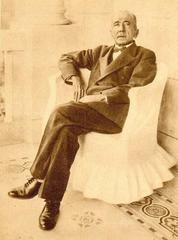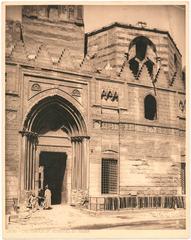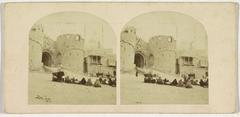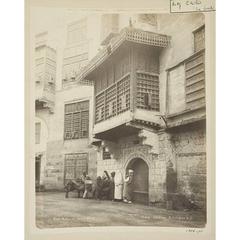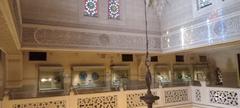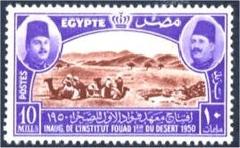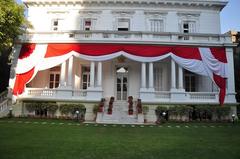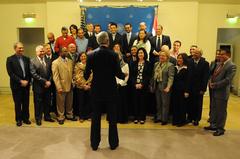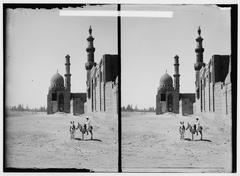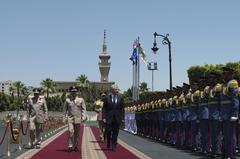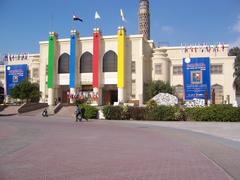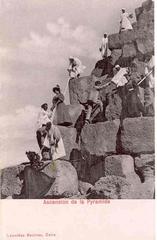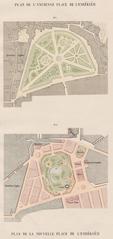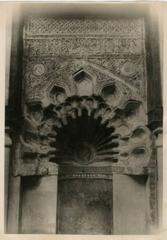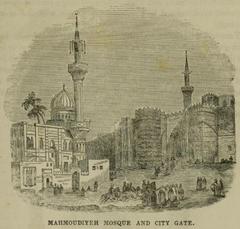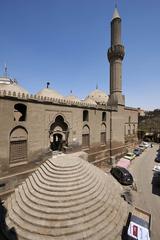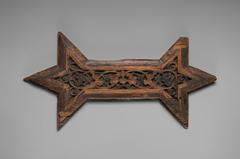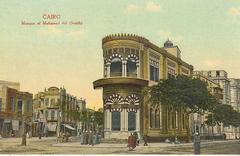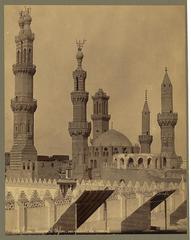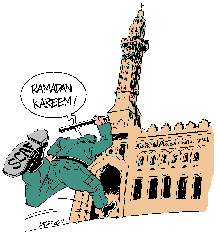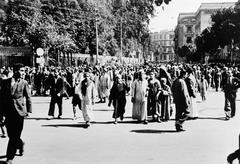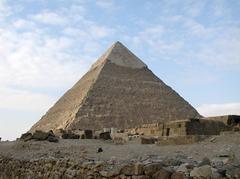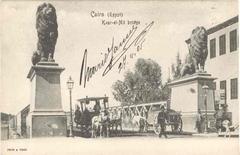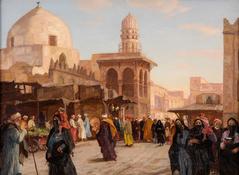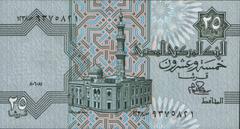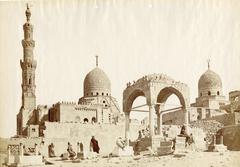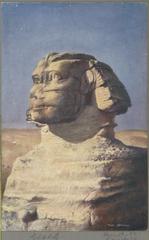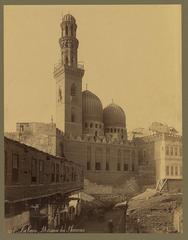
Egyptian Military College Visiting Hours, Tickets, and Historical Significance in Cairo, Egypt
Date: 03/07/2025
Introduction
The Egyptian Military College (EMC) in Cairo is one of Egypt’s most storied and prestigious institutions. Established in the early 19th century by Muhammad Ali Pasha, the college has played a pivotal role in shaping Egypt’s military leadership, national identity, and modernization efforts (Military Technical College History; tourHQ). Though public access to the college is restricted, the historical and symbolic importance of the EMC is immense, with its legacy woven deeply into the fabric of Egyptian society and governance.
This comprehensive guide provides an in-depth look at the Egyptian Military College’s history, cultural significance, visitor access policies, and practical tips for those interested in Egypt’s military heritage. Alternative suggestions for experiencing Egypt’s military history are also provided for travelers unable to access the college itself.
Table of Contents
- Introduction
- History and Foundation
- Modernization and Institutional Role
- Cultural and Symbolic Significance
- Visitor Information
- Alternative Military and Historical Attractions
- Dress Code and Cultural Etiquette
- Health, Safety, and Practical Considerations
- Frequently Asked Questions (FAQ)
- Conclusion
- References
History and Foundation
Founded in 1811 by Muhammad Ali Pasha, the Egyptian Military College was established to professionalize and modernize Egypt’s armed forces, reducing dependency on foreign officers and boosting the country’s self-reliance (Military Technical College History). The college quickly became the principal training center for Egypt’s military leadership, contributing significantly to the nation’s sovereignty and modernization.
Throughout the 20th century, the curriculum expanded to include not only military sciences but also engineering, technology, and advanced leadership studies. The college’s influence was most pronounced during the era of Egypt’s independence and subsequent regional conflicts, producing leaders such as Gamal Abdel Nasser, Anwar Sadat, and Hosni Mubarak—each of whom played decisive roles in Egypt’s history (tourHQ).
Modernization and Institutional Role
The Egyptian Military College has continued to evolve, integrating advanced military tactics, engineering, and leadership training into its programs. In collaboration with institutions like the Military Technical College (MTC), the EMC has fostered technological advancement and contributed to Egypt’s ongoing defense modernization (Military Technical College History). The establishment of specialized branches, such as the Air Defence College, further demonstrates the institution’s regional significance and commitment to excellence (ITC Egypt).
Today, the Egyptian Military Academy complex, of which the EMC is a part, is located in the New Administrative Capital, blending tradition with modern facilities. The EMC continues to attract both Egyptian and allied international students, serving as a hub for military education in the Middle East (ITC Egypt).
Cultural and Symbolic Significance
The EMC is far more than just a military training ground. As a symbol of national pride and resilience, it represents discipline, leadership, and Egypt’s pursuit of sovereignty. The college’s ceremonies, parades, and annual graduations are important cultural events attended by governmental and military dignitaries. Its alumni have left indelible marks not just in military service, but also in Egyptian politics and governance, underscoring the institution’s broad societal impact (tourHQ).
Visitor Information
Visiting Hours and Access
The Egyptian Military College does not maintain regular public visiting hours. As an active military installation, access is strictly limited to:
- Military personnel and cadets
- Official governmental and diplomatic delegations
- Pre-arranged educational groups
- Immediate family members during special ceremonies (Standyou)
Occasionally, the EMC may open its campus or museum for special events, graduation ceremonies, or national holidays. Such access requires prior invitation, registration, and security clearance. There are no general ticket sales or spontaneous public visits (theegyptiantraveler.com; Egyptian Ministry of Defense).
Tickets and Entry Requirements
- Tickets: Not available for public purchase. Access is generally by invitation only.
- Required Documentation: Visitors must present a valid passport and official invitation or clearance letter. Egyptian visas are required for foreign guests (Ireland.ie).
- Security Checks: All visitors are subject to thorough security screening, including inspection of personal belongings and electronic devices (Travel.gc.ca).
Security and Visitor Guidelines
- Photography: Prohibited except in designated areas during authorized events (Travel.gc.ca).
- Dress Code: Modest, respectful attire is mandatory; see the dress code section below.
- Conduct: Follow all instructions from military personnel, avoid sensitive discussions, and do not attempt to access restricted areas.
Special Events and Delegation Visits
Special events such as graduation ceremonies, public parades, or international academic conferences (e.g., International Telecommunication Conference - ITC Egypt 2025) occasionally allow for limited public or delegation access (ITC Egypt). Educational and research groups may arrange guided tours by prior application and security vetting.
Accessibility and Travel Tips
- Location: The EMC is in Cairo’s El-Qobba district; the main academy complex now operates in the New Administrative Capital (Standyou).
- Transportation: Access is via pre-arranged transport or official shuttles during events. Public transport is not available within the restricted zone.
- Facilities: Wheelchair access is limited; restrooms and refreshment areas are available during special events only.
Alternative Military and Historical Attractions in Cairo
National Military Museum at Cairo Citadel
If access to the EMC is not feasible, the National Military Museum at the Citadel in Cairo is a superb alternative. The museum features extensive exhibits on Egypt’s military history, including memorials, panoramic halls, and outdoor displays of tanks and aircraft (Flying Carpet Tours). The Citadel also houses the Mosque of Muhammad Ali and offers panoramic views of Cairo (Miss Tourist).
National Museum of Egyptian Civilization (NMEC)
NMEC provides a broader historical context, including military artifacts and exhibits on Egypt’s evolution (Egyptian Streets).
Dress Code and Cultural Etiquette
- Men: Long trousers and collared shirts are required; avoid shorts and casual wear.
- Women: Shoulders and knees should be covered; opt for loose-fitting clothing. A headscarf is not mandatory but is considered respectful (The Intrepid Guide).
- Footwear: Closed-toe shoes are recommended.
- Behavior: Do not salute or mimic military gestures unless instructed. Refrain from political discussions, and always follow the instructions of military personnel (Travejar).
Health, Safety, and Practical Considerations
- Hydration: Bring bottled water if permitted, as Cairo’s climate can be hot (The Intrepid Guide).
- Medical Needs: Notify escorts in advance of any health concerns.
- Safety: Remain within designated areas and stay with your group or guide at all times.
- Restrooms: Basic and gender-segregated, available during official events.
Frequently Asked Questions (FAQ)
Can tourists freely visit the Egyptian Military College?
No. Access is restricted to military personnel and official delegations. Public visits require prior approval and are only possible during designated events.
Are there regular visiting hours or tickets available?
No. There are no public visiting hours or ticket sales for tourists.
Are guided tours offered?
Guided tours are reserved for authorized delegations or educational groups with prior arrangement.
Is photography allowed?
No, except in specific areas and during authorized events when explicit permission is granted.
What alternatives exist for military history enthusiasts?
The National Military Museum at the Cairo Citadel and the National Museum of Egyptian Civilization are both excellent and publicly accessible options.
Conclusion
The Egyptian Military College is not only a cornerstone of Egypt’s military tradition but also a living monument to its national identity and historical evolution. While stringent security means public visits are rare, staying informed about special events and alternative attractions allows travelers to engage meaningfully with Egypt’s military heritage. Combine your military history explorations with visits to the Cairo Citadel and other historic sites for a comprehensive cultural experience.
Stay informed about visiting opportunities by checking official sources and enhance your trip planning with the Audiala app and our up-to-date travel resources.
References
- Military Technical College History
- tourHQ
- theegyptiantraveler.com
- Standyou
- ITC Egypt
- Egyptian Ministry of Defense
- Flying Carpet Tours
- Egyptian Gazette
- Egypt Tourism Authority
- Ireland.ie
- Travel.gc.ca
- The Intrepid Guide
- Travejar
- Miss Tourist
- Egyptian Streets
For more travel tips and historical insights, download the Audiala app and follow us on social media.

